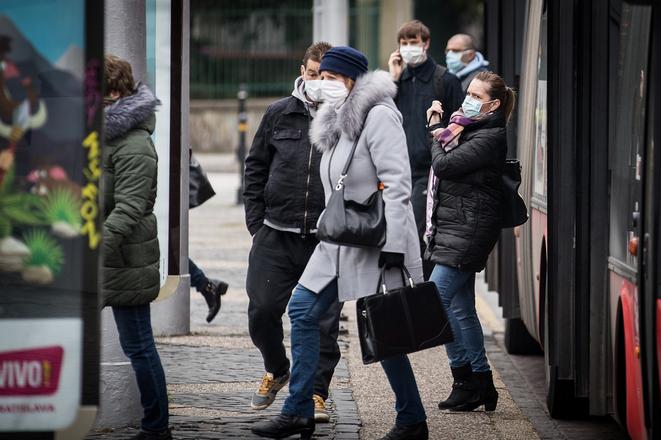Our paywall policy
The Slovak Spectator has decided to leave all the articles about the coronavirus available for everyone. If you appreciate our work and would like to support good journalism, please buy our subscription. We believe this is an issue where accurate and fact-based information is important for people to cope.
Having one's glasses mended or buying gardening equipment will become easier in Slovakia as of Monday. The government is opening selected shops that have been closed for the past two weeks as part of the coronavirus measures.
Only shops that can adhere to tighter hygienic measures will be allowed to open, though. The number of people inside the shop will be limited and disinfection will be required upon entering.
PM Igor Matovič announced the new rules, valid as of March 30, after the Friday night session of the crisis staff.
"It will not create risks and it will allow the economy to start living a little," Matovič told the press conference. The ruling coalition will debate measures for businesses over the weekend; they are expected to come up with measures that will help particularly small and medium companies who find themselves facing significant problems.
State quarantine for all returnees
He stressed that everyone needs to act responsibly, and if it turns out people are not following the rules, the shops will be closed again, individually or en masse.
Chief hygienist Ján Mikas announced that pharmacies holding emergency turns and veterinary ambulances will remain open on Sunday, when everything else is to be closed for sanitation day. This applies as of Sunday, March 29.
In addition, he announced the state is planning another measure: to have all Slovak citizens returning from abroad detained for compulsory quarantine in state facilities. For now, only those who return within the state-organised repatriation efforts are placed into quarantine in state facilities, while those arriving individually are required to stay quarantined at home.
Latest coronavirus measures for shops
Stricter hygienic standards for shops include:
- hand disinfection and/or gloves for all customers upon entering the shop,
- maintaining a distance of at least 2 metres between customers,
- limit to the number of people allowed into the shop (one person per 25 square metres).
As per the previously announced rules, people are required to maintain a 2-metre distance from each other in queues. Shops will reserve 9:00 - 12:00 as shopping hours for people over 65 years. Masks are compulsory in Slovakia in all public places, including all shops and virtually everywhere outside ones' home.
Coming into force on April 21 midnight, state hygienists introduced some new rules for wearing masks. Although it is still mandatory to cover one’s nose and mouth while being outside, there will be several exceptions:
children younger than 2 years of age;
people walking in nature, but they have to live in one household and are required to keep a distance of at least 20 metres from others;
people suffering from serious autism spectre disorders;
people in a car if they live in the same household;
public transport drivers if they are in enclosed a cabin.
Shops that will be allowed to open as of March 30: opticians, leasing companies, technical control of vehicles, IT services, attorneys and notaries, key services, waste-collection points, haberdashery and fabric shops, bicycle sale and repair shops, gardening shops, building material shops, hardware shops, paint and varnish shops.
Large shopping centres remain closed, however, including small shops located within them, with the exception of supermarkets, drug stores, pharmacies and newsagents.
Which shops will be open from March 30?
shops selling groceries, meat, bakery products, fruits and vegetables; grocery stores selling special food for babies and small children; and stores selling food for special medical purposes;
drug stores;
pharmacies, shops selling medical aids;
opticians;
news stands;
shops selling animal food
vets;
telecom provider branches;
cafeterias and fast food stalls;
branches of postal, banking, insurance and leasing service providers;
brick-and-mortar eshop units, where people collect their orders and get delivery services;
laundromats and dry cleaner’s;
petrol stations;
funeral services and crematoriums;
car repair shops, tyre services and towing services;
technical inspection and vehicles emission control stations;
ICT technology repair services;
taxi services to transport goods only;
offices of lawyers, notaries, court distrainors, bankruptcy administrators, mediators, auctioneers, experts, translators and interpreters;
key services;
collection yards;
haberdasheries;
bicycles shops and repair shops;
garden centres (if the inner shopping area does not exceed 2,000 square metres);
shops selling construction materials, installation and wiring material, ironmongers, paint shops (if the inner shopping area does not exceed 2,000 square metres).
Please note: These changes do not include shopping centres, where only grocery stores, drug stores, pharmacies and news stands can be opened.
This article was first published on March 28, 2020.


 People in protective masks on public transport in Bratislava. (source: Sme - Jozef Jakubčo)
People in protective masks on public transport in Bratislava. (source: Sme - Jozef Jakubčo)